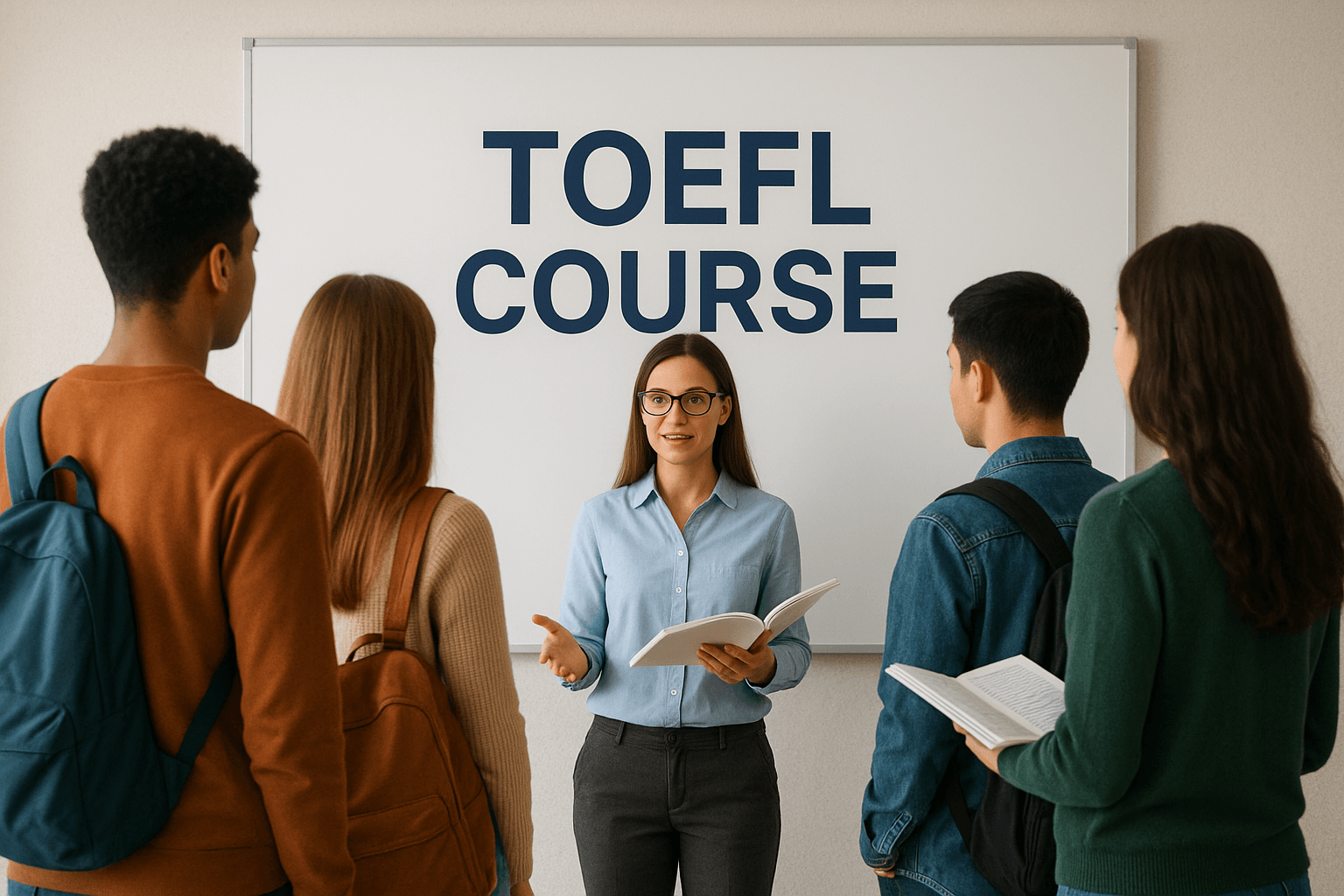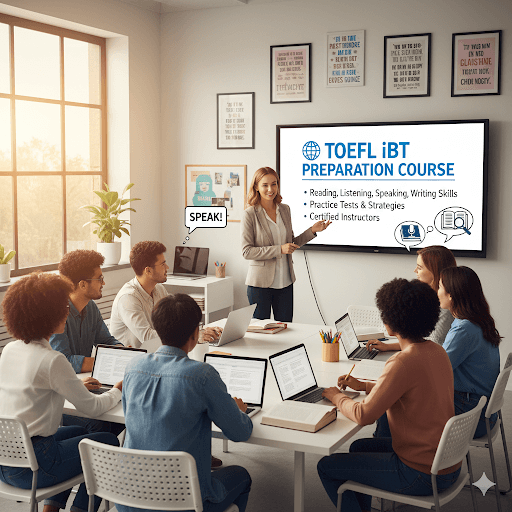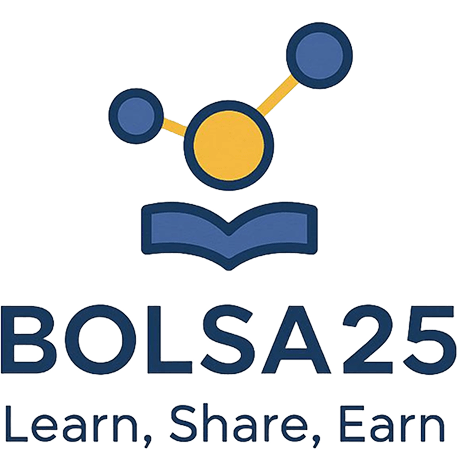The journey toward higher education or a global career often leads to a significant milestone: the TOEFL exam. For millions of non-native English speakers, a high TOEFL score is the key that unlocks the door to prestigious universities and international opportunities. However, the path to achieving that score can be daunting. The test is not just about knowing English; it’s about demonstrating academic English proficiency under pressure. Many students find themselves lost in a sea of free resources, practice tests, and conflicting advice, unsure of how to structure their preparation for real, measurable progress. This is where a dedicated TOEFL course transforms the journey from a path of uncertainty into a clear roadmap for success. It provides the structure, expert guidance, and targeted feedback necessary to conquer the exam. This guide will explore every facet of choosing the right preparation program, ensuring you invest your time and resources wisely. At Bolsa25, we specialize in turning anxious test-takers into confident communicators, and our approach to the TOEFL course online is designed to do just that.

Importance of taking a TOEFL course
While self-study is a noble endeavor, it often lacks the critical components needed for high-stakes exam preparation. The internet is filled with tips and tricks, but these are no substitute for a comprehensive, structured learning experience. Enrolling in a high-quality TOEFL course is one of the most effective investments you can make in your future. Here’s why:
- Structured Curriculum: A well-designed course provides a logical, step-by-step curriculum that covers all four sections of the TOEFL—Reading, Listening, Speaking, and Writing. It ensures you build foundational skills before moving on to advanced strategies, preventing gaps in your knowledge. This structured approach eliminates the guesswork of “what should I study next?”
- Expert Guidance and Strategy: The TOEFL is as much a test of strategy as it is of language. Experienced instructors who specialize in the TOEFL can teach you proven techniques for time management, note-taking, and tackling each specific question type. They can explain the scoring rubrics in detail, helping you understand exactly what the examiners are looking for, especially in the subjective Speaking and Writing sections.
- Personalized Feedback: This is arguably the most crucial benefit. It’s nearly impossible to accurately assess your own speaking and writing. A qualified instructor can provide targeted, actionable feedback on your essays and spoken responses, pointing out recurring grammatical errors, structural weaknesses, or pronunciation issues that you may not even be aware of. This feedback loop is the fastest way to improve your productive skills.
- Motivation and Accountability: Preparing for the TOEFL is a marathon, not a sprint. Being part of a course, with scheduled classes and assignments, provides the accountability needed to stay on track. The shared goal and community aspect, especially in live classes, can be a powerful motivator during challenging periods of study.
Ultimately, a good TOEFL course saves you time by focusing your efforts on what truly matters, providing a clear path to improvement that is difficult to replicate on your own.
Who needs a TOEFL course?
While anyone preparing for the exam can benefit from a structured program, certain types of students find a TOEFL course particularly indispensable. Do you see yourself in any of these profiles?
- The Ambitious High-Achiever: You already have a good command of English, but you’;re applying to a top-tier university that requires a score of 100 or even 110+. At this level, small mistakes in nuance, structure, and delivery can make all the difference. A specialized course can provide the advanced strategies and expert feedback needed to push your score from good to exceptional.
- The “Stuck” Student: You’ve taken multiple practice tests or even the official exam, but your score is plateauing. You can’t seem to break past a certain number, like 79 or 89. This indicates a fundamental weakness that self-study isn’t addressing. A course can provide a fresh perspective and a diagnostic approach to identify and fix the specific issues holding you back.
- The Busy Professional: You’re juggling a full-time job and other responsibilities, leaving you with limited time to study. A structured TOEFL course online offers the efficiency you need, providing a curated curriculum and clear assignments. It maximizes your limited study hours by focusing only on high-impact activities.
- The Anxious Speaker: Your reading and listening skills are strong, but the thought of the Speaking section fills you with dread. You need a safe, supportive environment to practice speaking under pressure and receive constructive feedback. The interactive, conversation-focused classes at a place like Bolsa25 are specifically designed to build this kind of confidence.
- The Beginner: You’re just starting your TOEFL journey and feel overwhelmed by the sheer volume of information. A comprehensive course provides a foundational roadmap, guiding you from the very basics of the test format to the advanced skills needed for a high score.
What is a TOEFL Course?
So, what is a TOEFL course exactly? It’s much more than a collection of practice questions. A comprehensive TOEFL course is a specialized academic program designed to systematically prepare students for every aspect of the TOEFL iBT exam. It combines skill-building, strategy instruction, and simulated practice into a cohesive learning experience. The TOEFL course details typically include several core components:
- Skill Development Modules: The course is broken down into modules focusing on the four core skills tested: Reading, Listening, Speaking, and Writing. These modules go beyond simple practice. For example, a Reading module might teach you how to identify main ideas, make inferences, and understand complex sentence structures, while a Speaking module would focus on pronunciation, intonation, fluency, and structuring a coherent response.
- Strategic Training: This component teaches you how to “play the game.” You’ll learn specific strategies for each of the 10+ question types in the Reading section, effective note-taking systems for the Listening section, templates for structuring your Speaking and Writing responses, and critical time-management techniques for the entire exam.
- Practice and Simulation: A good course includes access to high-quality practice materials, including full-length mock tests that simulate the real exam environment. This allows you to apply the skills and strategies you’ve learned under authentic, timed conditions.
- Expert Feedback and Analysis: As mentioned, this is a key differentiator. The course provides a mechanism for you to submit your speaking and writing tasks for evaluation by a trained instructor. This feedback is based on the official TOEFL scoring rubrics, giving you a clear understanding of your strengths and weaknesses.
In essence, a TOEFL course is a holistic training program that addresses not just what is on the test, but how to master it.
Types of courses: online, offline, intensive, self-paced
The world of TOEFL preparation offers a variety of course formats, each catering to different needs and learning styles. The four primary categories you’ll encounter are online courses, which offer flexibility and accessibility from anywhere; offline (or classroom-based) courses, which provide a traditional, in-person learning environment; intensive programs, which are short-term, high-intensity bootcamps designed for rapid improvement; and self-paced courses, which give you complete control over your study schedule, allowing you to learn at your own speed.
Different Types of TOEFL Courses
Choosing the right format is a critical decision. Let’s break down the key differences to help you determine which type of TOEFL course is the best fit for you.
Online vs. classroom-based
The most fundamental choice is between learning online or in a physical classroom. A TOEFL course online, like the programs offered at Bolsa25, provides unparalleled flexibility and convenience. You can learn from the comfort of your home, eliminating commute time and costs. Online courses often provide access to a wider range of digital resources and can connect you with expert instructors from around the world. In contrast, traditional classroom-based courses offer face-to-face interaction and a more structured, scheduled environment, which some students find helps with discipline and focus.
Free vs. paid courses
While the allure of a free course is strong, it’s important to understand the trade-offs. Free courses can be a good starting point to familiarize yourself with the TOEFL Test format, but they typically lack the depth, quality, and, most importantly, the personalized feedback of a paid program. A paid TOEFL course is an investment in expert instruction, a professionally developed curriculum, high-quality practice materials, and, crucially, one-on-one feedback on your speaking and writing. This level of support is what typically leads to significant score improvements.
Short-term intensive vs. long-term study programs
The right toefl course duration depends on your timeline and learning style. An intensive or “bootcamp” style course packs a large amount of information and practice into a very short period (e.g., 2-4 weeks). This format is ideal for students who have an upcoming test deadline and can dedicate themselves fully to studying. A long-term program, spanning several months, allows for a deeper, more gradual absorption of material. This is often better for students who are also working or studying, or for those who need to build their fundamental English skills from a lower level before focusing on test strategy.
How to Choose the Right TOEFL Course?
With so many options available, selecting the perfect TOEFL course can feel overwhelming. By breaking the decision down into a logical process, you can confidently choose a program that aligns with your needs.
Identifying personal goals and target score
Before you even start looking at courses, you need to define what success looks like for you. What is your target TOEFL score? Check the requirements for the universities or programs you’re applying to. A student aiming for an 80 has very different needs from a student aiming for a 105. Be honest about your current English level. Taking a diagnostic test can provide a realistic baseline. Your goal is the gap between your current score and your target score. This will help you determine the intensity and duration of the course you need.
Considering the budget, schedule, and learning style
Next, consider the practical constraints. What is your budget? While you shouldn’t choose based on price alone, it’s a significant factor. What is your schedule like? If you work full-time, a flexible online course with recorded lessons might be better than a rigid, live classroom schedule. Most importantly, what is your learning style? Do you thrive on interaction and discussion, or do you prefer to learn independently? If you value interaction and real-time feedback, a live online course like those at Bolsa25, which emphasizes conversation and small-group learning, would be an excellent fit.
The chart above visualizes the trade-offs between different course formats. A self-paced online course offers maximum flexibility but may lack personalized feedback. A live online course strikes a balance, offering good flexibility and strong interactive feedback. A traditional classroom course offers the highest level of interaction, but at the cost of flexibility and often at a higher price.
Checking course reviews and credibility
Once you’ve narrowed down your options, it’s time to do your due diligence. Don’t just take the course provider’s marketing at face value. Look for independent reviews, testimonials, and success stories from past students. What is the background of the instructors? Are they experienced TOEFL specialists? Does the provider offer a free trial class or a sample of their materials? A credible institution will be transparent about its teaching methodology and the qualifications of its staff. This research ensures you’re investing in a program with a proven track record of success.

Common Mistakes When Choosing a TOEFL Course
In the rush to start preparing, many students fall into common traps when selecting a course. Avoiding these mistakes is just as important as knowing what to look for.
- Choosing Based on Price Alone: The cheapest option is rarely the best. A very low-cost course likely cuts corners on instructor quality, curriculum development, or, most often, personalized feedback. View the course as an investment in your future; a slightly higher cost that leads to a better score is well worth it.
- Ignoring the Teaching Style: A course might have great reviews, but if its teaching style doesn’t match your learning style, it won’t be effective for you. If you’re an interactive learner, a self-paced course consisting only of pre-recorded videos will likely lead to boredom and disengagement.
- Overlooking the Importance of Feedback: Many students sign up for a course assuming it includes detailed feedback on speaking and writing, only to find out it’s an expensive add-on or not offered at all. Always confirm the specifics of the feedback mechanism before enrolling. This is a non-negotiable component of a quality TOEFL course.
- Falling for “Guaranteed Score” Gimmicks: Be wary of any program that “guarantees” a specific score. A reputable institution knows that your success is a partnership; it depends on their instruction and your effort. Instead of guarantees, look for providers that offer a clear, proven methodology and strong student support.
In Conclusion
Navigating the path to TOEFL success is a significant undertaking, but you don’t have to do it alone. While self-study has its place, a structured, high-quality TOEFL course provides the expert guidance, strategic training, and personalized feedback that can dramatically accelerate your progress. By understanding your own goals, learning style, and budget, and by carefully evaluating the different types of courses available, you can make an informed decision that sets you up for success.
The right program does more than just teach you test-taking tricks; it builds your core English skills and your confidence. It transforms the TOEFL from an intimidating obstacle into a manageable challenge. At Bolsa25, our philosophy is built on this principle. Our live, interactive TOEFL course online is designed to provide not just the strategies you need to ace the exam, but the real-world communication skills you need to thrive in your future academic and professional life. We invite you to explore our programs and take the first step toward achieving your dream score.
FAQs
Here are answers to some of the most frequently asked questions about TOEFL preparation and courses.
A TOEFL course is a specialized educational program designed to prepare students for the TOEFL iBT exam. It typically includes in-depth instruction on all four sections , training on test-taking strategies and time management, access to practice materials and mock tests, and, most importantly, personalized feedback on speaking and writing from an expert instructor.
Neither test is objectively harder than the other; they are just different. The difficulty is subjective and depends on your skills and preferences. TOEFL is entirely computer-based and uses 100% academic content. Its questions are mostly multiple-choice. IELTS includes a mix of academic and real-world scenarios and features a wider variety of question types. The IELTS Speaking test is a live interview with a human examiner, which some find more comfortable, while others prefer the anonymous, computer-based format of the TOEFL Speaking section.
This question often arises from confusion with older test versions. The current TOEFL iBT is scored on a scale of 0 to 120. A score of 500 is not possible on this scale. This score likely refers to the old TOEFL PBT, which was scored from 310 to 677. On that scale, a 500 was considered a lower-intermediate score. When discussing modern TOEFL scores, always refer to the 0-120 iBT scale.
The best course is the one that best fits your individual needs. However, a top-tier course will always have these features: expert instructors with specialized TOEFL experience, a comprehensive curriculum covering both skills and strategy, high-quality practice materials, and a strong emphasis on personalized feedback for speaking and writing. For students who value flexibility and interactive learning, a live TOEFL course online like the one offered by Bolsa25 is often the ideal choice, as it combines the convenience of online learning with the crucial element of real-time, human interaction and feedback.
A score of 72 is in the low-intermediate range. Whether it is good depends entirely on your goals. It may be sufficient for admission to some community colleges or for conditional admission programs. However, for most undergraduate and graduate programs at universities in the US, Canada, or the UK, a score of 72 would be below the minimum requirement. Most universities require scores of 80 or higher, with competitive institutions often requiring 90 or 100+.What is the TOEFL course?
Is TOEFL harder than IELTS?
Is TOEFL 500 a good score?
Which course is best for TOEFL?
Is 72 a good TOEFL score?

